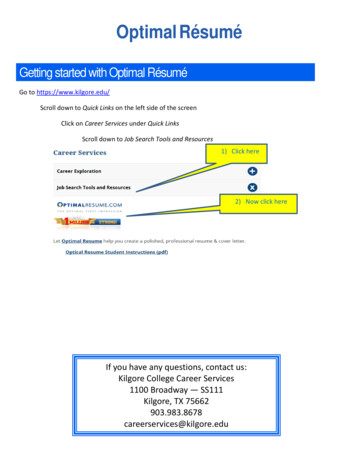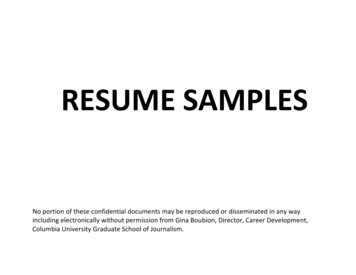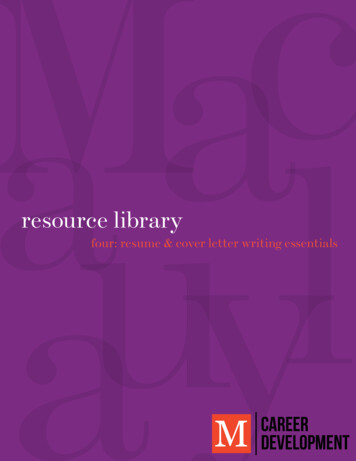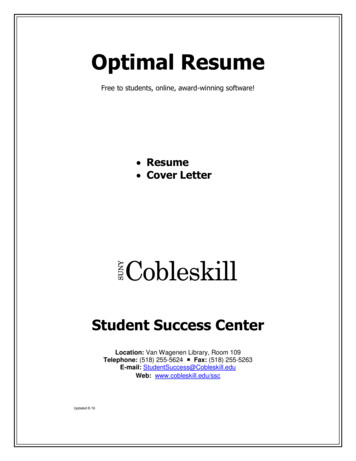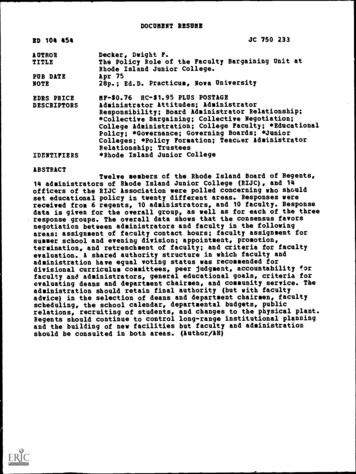
Transcription
DOCUMENT RESUMEED 104 454AUTHORTITLEPUB DATENOTEEDRS PRICEDESCRIPTORSIDENTIFIERSJC 750 233Decker, Dwight F.The Policy Role of the Faculty Bargaining Unit atRhode Island Junior College.Apr 7528p.; Ed.D. Practicum, Nova UniversityMF- 0.76 HC- 1.95 PLUS POSTAGEAdministrator Attitudes; AdministratorResponsibility; Board Administrator Relationship;*Collective Bargaining; Collective Negotiation;College Administration; College Faculty; *EducationalPolicy; *Governance; Governing Boards; *JuniorColleges; *Policy Formation; Teacier AdministratorRelationship; Trustees*Rhode Island Junior CollegeABSTRACTTwelve members of the Rhode Island Board of Regents,14 administrators of Rhode Island Junior College (RIJC), and 14officers of the RIJC Association were polled concerning who shouldset educational policy in twenty different areas. Responses werereceived from 6 regents, 10 administrators, and 10 faculty. Responsedata is given for the overall group, as well as for each of the threeresponse groups. The overall data shows that the consensus favorsnegotiation betimen administrators and faculty in the followingareas: assignment of faculty contact hours; faculty assignment forsummer school and evening division; appointment, promotion,termination, and retrenchment of faculty; and criteria for facultyevaluation. .A shared authority structure in which faculty andadministration have equal voting status was recommended fordivisional curriculum committees, peer judgment, accountability forfaculty and administrators, general educational goals, criteria forevaluating deans and department chairmen, and community service. Theadministration should retain final authority (but with facultyadvice) in the selection of deans and department chairmen, facultyscheduling, the school calendar, departmental budgets, publicrelations, recruiting of students, and changes to the physical plant.Regents should continue to control long-range institutional planningand the building of new facilities but faculty and administrationshould be consulted in both areas. (Author/AM)
4U S DEPARTMENT Of 14E TNEDUCATION IL WELFARENATIONAL INSTITUTE OfEDUCATION-THIS DOCUMENT HAS BEER REPRODOLED EXACTLAS RECEIVED FROMTHE PERSON OR ORGANIZATION ORIGINACING IT POINTS OF VIEW OR GPII.GONSSTATED DO NOT NECESSARILY RIPRESENT OFFICIAL NATIONAL INSTITUTE OFEDUCATION POSITION OR POl ICYThe Policy Role of the Faculty Tlar'rainin7Unit at Rhode Island Junior CollegebyDwight F. Decker, M.S.E.Rhode Island Junior ColleeA Practicum Presented to Nova UniversityIn Partial Fulfillment of the RequirementsFor the Degree of Doctor of EducationNova UniversityNApril Fs,1975
TABLE OF CONTENTSPAGEITEMIntroduction1Background and Significance5Procedure910ResultsTABLE 1 -OVERALL RESPONSE TO QUESTIONNAIRE11TABLE 2 -REGENTS' RESPONSE13TABLE 3 -ADMINISTRATORS' RESPONSE15TABLE 4 -FACULTY OFFICERS' RESPONSE17Recommendations21References23Appendix A253.
4IntroductionThe Rhode Island school teachers arbitration act of 1966Glare often called the Nichaelson hot, named for the statesenator who introduced it) gives "certified public schoolteachers the right to organize, to be represented, to negotiateprofessionally and to bargaining on a collective basis withschool committees covering hours, salary, working conditions,and other terms of professional employment".It does notgrant the right to strike and it excludes superinteadentsand principals from the bargaining unit.For teachers at publicly supported colleges (such asRhode Island Junior College), the Board of Regents replacesthe school committee; and all Presidents, Vice Presidents,deans, and others having personnel supervisory functions except department chairmen are excluded from the bargaining unit.No faculty member is required to become a member of thecertified bargaining unit, but state law, provides an agencyshop situation only in so far as every faculty member mustpay bargaining unit dues.The present contract between the Board of Regents andthe Rhode Island Junior College Faculty Association (an affiliateof the NEA) provides specifically negotiated Policyand procedures for the following:* faculty contct hours,* assignments for summer and evening; divisionto aching,4
* appointment, promotion, termination, and retrenchment,* criteria for faculty evaluation,* selection of deans and department chairmen, and* participation in divisional curriculum committees.In all these areas, no administrative decision can be madewithout either prior faculty approval or the right of facultyto challenge.The contraGt also provides that the faculty must be consulted for an advisory opinion before policy decisions aremade in the following areas:* long range planning,* President's Advisory Council,* faculty scheduling,* the school calendar, and* department bud:;ets.Let it be assumed that the Board of Regents, the administration, and the bargaining unit agree that the paramountgoal for Rhode Island Junior College's existence is to servethe educational needs of the Rhode Island community whichare not being met by other public colleges or other agencies.The problem presents itself when one considers how bestto determine policy to implement that goal.To be morespecific, the following questions might be asked:1. What policy decisions ore best arrived at polit-ically - a negotiated settlement between the administration (representing the Regents) and thefaculty bargaining5
342. What decisions are best made by the administration using the faculty on an advisory basis?3. What decision ; are best made on a sharedauthority basis with both administrators andfaculty having voting status?Using these three questions to attack the problem ofwho shOuld determine policy and how should decisions be madeto implement policy, the following areas not covered by thecontract could also be considered:* public relations-particularly translating to thepublic the importance of the academic function,* peer judgment,* recruiting of students,accountability (both faculty and administration),* educational goals,* physical plant,* evaluation of deans and department chairmen, and* community service to solve community problems.This paper has limitations which have been imposed tokeep it from becoming too global to be properly researched.It does not address faculty welfare issues (salary, fringebenefits, leaves, college services, etc.).Furthermore, itdoes not solicit student opinion nor consider the odvisabilityof setting up unions for students.The issues involved vil1 b.! those 1?:eviously mentionej,ell of which fP.11 within the :Prize of educ;-ttionalwhich influences the learnin: prococs.
- 4How Rhode Island Junior College ( C) makes decisions inthese matters will determine whether or not Rhode Islanderswill continue their vigorous support of RIJC in a time ofgrowing economic uncertainty.7
Background and SienificanceOn the subject of faculty unions having participation inthe formulation of educational policy, the literatu2e of recentyears is very divided.Some favor collective bargaining ineducational policy areas and some do not.In addition to thesepro-union and anti-union positions, others favor joint participation of faculty and administration in educational policyareas.A report from the CEAS Abstract Series1 from an international meeting of teachers' union representatives held inSophia, Bulgaria states that teachers have an obligationto their students to strive for active participation in educational policyiaking and organization.Coleman2 evenenvisions a form of collective bargaining which could enhancethe goal of universal higher education.Selden3 vies teachers' unions as having a unique rolein educational policy - offering solutions to problems without prior commitment to v,:sted interests or to established,outmoded, or inadequate programs.The New York City teachers,for example, have had considerable impact on curriculumdetermination, textbook selection, and special edycationalprograms.The More Effective Schools Plan for better remedialand psychological services had remarkable results over aLhrez! yen' 1,2riodthu time ofelden's report.
Several authors advocate a joint participation offaculty and administrators in forming educational policytotally outside of the collective bargaining process.Keppelcalls for a cooperation of faculty, administration, andgovernmental and political uhits to share authority in asystem that would provide the checks and balances necessaryto protect individual rights and at the same time establishand maintain meaningful educational standards.In a similarvein, Howard5 argues that intruding forces -- parents,teachers, unions, and students -- should be included inpolicymaking discussions so that dissent can be incorporatedconstructively into the fabric of educational policymaking.A report of the Educational Policies Commission6 viewsthe teacher as being a necessary contributor to the formulation of educational policy who recognizes that theultimate control of education is justly and legally a publicfunction.The retort emphasizes the teacher's right toinfluence public policies and praises such influence as agood example to students.Dostein7 states that agreements should be reached byconsensus rather than by administrative fiat, with teachersand administrators relatin:: as Partners rather tnan asadversaries.Common goals, open eumunication, and autualrespect are vitcl to this T;rocecs.94
7topicThe largest body of literature uertinent tois opposed to faculty unions participating in formulation ofeducational policy.Sargent8warns that increased power ofteacher unions due to a massive increase in membership couldcreate an imbalance among competing power centers, leading toserious social dislocation.9On only a slightly less threatening note, Medlynaccuses teachers of grasping after a "bilateral" managementof education.Doherty10also states that bilateral deter-mination of school policy in public education is rapidlybecoming the norm as collective negotiation grows at bothlocal and state levels.Competition between NFA and AFT tobecome the exclusive bargaining agent for teachers has fosteredthis trend.Seaberg and Ulibarri 11 report that, in New Mexico, teacherorganisations and administrators generally agree on what isimportant in decision making and policy formulation but disagree as to who should do it.The teachers want a voice, butthe administrators claim policymaking is strictly a domainof administrators and the governing board.Sandin12 deplores the drift toward unionization in theprofession of college teaching.The dominance of thelabor - management model is tendir; to fragmentize thecollegl.atc zystcF.7roups.into bailiwicks, presided over by interestIt is felt that such a systen will 1.,c lez;s purposive,and more ou3ceptibh: ?nd Tesforsive to privLe interost.r,rcner than the public Eccci.10
8With such P diverzence of opinion concerninthe properplace of faculty unions in the area of policymaking, theauthor felt this matter should be studi'ed as it relates toRhode Island Junior College.11
- 9 -12roc:,(' uresA auestionndiro was made listing all the educationalpolicy areas in tho Present contract plus the other eghtpolicy areas included in the introduction.Members of taeBoard of Regents, administrators at RIJC, and Executive Boardmembers o the Faculty Association were asked to expresstheir opinion on each iten concerning whether that area should(1) be the exclusive province of -one group, (2) be decidedby the administration with the advice of the faculty or bythe Board of Regents with advice from administrators andfaculty, (3) be negotiated into the contract by adversaryproceedings, or (4) be jointly shared by both faculty andadministration.Administrators selected included only those .rho havesupervisory roles co kerning other faculty or staff - thePresident;;two Vice Presidents, and the deans.ExecutiveEoard members, being elected, were chosen as being representative of the faculty.It is assumed that the Board ofRegents with their broadly based backgrounds represent thecitizens of Rhode T:land.No attempt has been made to solicit student opinionbecause no one sin:le body has been elected cc repreLentstudents.Shoul.- '.::-random sampling of student opinion beattempted, the task would boco-::e far too largo athis time.Anonymity fo2 rozpondents . 1s 1:rovidod ( ;ac Ap;endi:: .,).12
- 10 -RPsultsThe results of the questionnaire are shown in tabulatedform in the four tables beginning with the next page.Theyare broken down as follows:(1) Total responses - Regents, administrafaculty officers,(2) Regents' responses,(3) Administrators' responses,and(4) Faculty officers' responses.Of the twelve Regents, six responded; it is hoped thatthese six are representative of the total group.For theadministrators and faculty officers, ten out of a total offourteen responded in each case; these cross-sections shouldbe valid indicators of opinions for both groups.Examination of the overall data (Table 1) shows severaldominant trends.A consensus feels that the following policiesshould be negotiated by administrators and faculty and includedin the contract:* the assignment of faculty contact hours,* faculty assignment for summer school and eveningdivision,* appointment, promotion, terrination, andretrenchment of faculty, andi(criteria for far.ulty evaluation.'3
- 11 TABLE 1REGMTS, ATISTRATORS15E TT-O7F ICOVER2ILL RESPO OUESTIO:MAIREFor each of the items below, please use the followingletter code in filling in the blank space which precedeseach item:A - I think policy in this area should be shared byadministrators (acting on behalf of the Regents)and the faculty with each having voting status.B - In my opinion, this policy should be arrived atby the administration and faculty through thenegotiation process and clearly stated in thecontract.C - This policy responsibility belongs to the administration, but the faculty should be consulted foradvice.D - This policy responsibility belongs to the Regents,but the administrators and faculty should be consulted for advice.E - This policy responsibility lies exclusively withthe administration.F - This policy responsibility lies exclusively withthe Regents.Give your opinion concerning how policy should be determinedin the following areas:ABCDEF3145120212100202146030815400191110411. The assignment of contacthours (classes and laboratory sessions) per week whichare given to faculty.2. Faculty assignments for summerschool and evening divisionteaching.3. The appointment, promotion,termination and retrenchmentof faculty.4. Criterie for faculty evaluation.5. Selection ots dons and depar,ment chairmer.14
- 12 714550103279136. Participation in divisionalcurriculum committees.7. Long range institutional35120503. Faculty scheduling.64111319. The school calendar.401803110. Departmental budgets.421505011. Institutional public relations.1174011201606112. Peer judgment of faculty byfaculty or administrators byadministrators.13. Recruiting of students.115604014. Accountability for faculty.9225L415. Accountability for administrators.925613101552216. General educational goals ofthe institution.17. Changes to the physical plant.3081013758231908511plannino.18. .The building of new physicalplant.19. Criteria for evaluation ofdeans and department chairmen.20. Community service to solvecommunity problem.15
- 15 MBLI:REGENT3' RESPO QUE ONNAIREFor each of the ite:1,s below, please use the followingletter code in filling in the blank space which precedeseach item:A - I thrik policy in this area should be shared byadministrators (acting on behalf of the Regents)and the faculty with each having voting status.B - In my opinion, this policy should be arrived atby the administration and faculty through thenegotiation process and clearly stated in thecontract.C - This policy responsibility belongs to the adrninistration, but the faculty should be consulted foradvice.D - This policy responsibility belongs to the Regents,but the administrators and faculty should be consuited for advice.E - This policy responsibility lies exclusively withthe administration.F - This policy responsibility lies exclusively withthe Regents.Give yoilnopinion concerning how policy should be determinedin the following areas:ABCDEFO22100O13020102001. The assignment of contacthours (classes and laboratorysessions) per week which aregiven to faculty.2. Faculty assignments for summerschool and evening divisionteaching.3. The appointment, promotion,termination and retrenchmentof faculty.1130014. Criterii., for faculty evaluation.1010315. Selection of dens and department chairmen.16
1-1C*D*F1030100003020030306. Participation in divisionalcurriculum committees.7. Long range institutionalplanning.8. Faculty scheduling.0020319. The school calendar.00501010. Departmental budgets.00402011. Institutional public relations.20101100204012. Peer judgment of faculty byfaculty or administrators byadministrators.13. Recruiting of students.10302014. Accountability for faculty.11110315. Accountability for administrators.00031200120216. General educational goals ofthe institution.17. Changes to the physical plant.0C120210202119. Criteria for evaluion of003001deans and department chairmen.20. Community service to solvecommunity problems.18. The building of new physicalplant.17
- 15 -3ADT.IINISTaATORS' RESPOITSECAPSTI OH: TAT:33For each of the items below, please use the followingletter code in filling in the blank space which precedes eachitem:A - I think policy in this area should be shared byadministrators (acting on behalf of the Regents)and the faculty with each having voting status.BIn my opinion, this policy should be arrived atby the administration and faculty through thenegotiation process and clearly stated in thecontract.C - This policy responsibility belongs to the administration, but the faculty should be consulted foradvice.D - This policy responsibility belongs to the Regents,but the administrators and faculty should be consulted for advice.2 - This policy resi.)onsibility lies exclusively w4t;1the administration.F - This policy responsibility lies exclusively withthe Regents.Give your opinion concerning how policy should be determinedin the following,. areas:A BC DE151010145000i140105100010801000531111. The assignment of contacthours (classes and laboratorysessions) per week which aregiven to faculty.2. Faculty assignments lor summerschool and evening divisionteaching.3. The appointment, promotion,termination and retrenchmlntof faculty.4. Criteria for faculty evaluation.5. Selection of deans and department chairmen.6. Participation in divisionacurriculum committees.18
- 16 ACDF0053110080207. Long range institutionalplanning.8. Faculty scheduling.2161009. The school calendar.00702110. Departmental budgets.701011. Institutional public relations.162200000900112. Peer judgment of faculty byfaculty or administratorsby administrators.13. Recruiting of students.h1301014. Accountability for faculty.30123015. Accountability for administrators.41220100631016. General educational goals ofthe institution,17. Changes to the physical plant.10350118. The building of new physical116110304200plant.19. Criteria for evaluation ofdeans and department chairmen.20. Community service to solvecommunity problems.
- 17 TAT1LE 4FACULTY OFFICERS' RESPONSQUESTITTAIREFor each of the items below, please use the folloiiingletter code in filling in the blank space which precedeseach item:A - I think policy in this area should be shared byadministrators (acting on behalf of the Regents)and the faculty with each having voting status.B - In my opinion, this policy should be arrived atby the administration and faculty through thenegotiation process and clearly stated in thecontract.C - This policy responsibility belongs to the administration, but the faculty should be consulted foradvice.D - This policy responsibility belongs to the Regents,but the administrators and faculty should be consulted for advice.E - This policy responsibility lies exclusively withthe administration.F - This policy responsibility lies exclusively withthe Regents.0,Give your opinion concerning how policy should be determinedin the following areas:ABCDEF2620001720001810003700001. The assignment of contacthours (classes and laboratorysessions) per week which aregiven to faculty.2. Faculty assignments for summerschool evening division teaching.3. The appointment, promotion,termination and retrenchmentof faculty.4. Criteria for faculty evaluation.710005.:iciection of deans and department chairmen.'20
-18-3CD7300003223003510006. Participation in divisionalcurriculum committees.7. Lon ; range institutionalplanning.8. Facu:ty scheduling.4330009. The school calendar.40600010. Departmental budgets.31402011. I 3titutional public relations.45100020502012. Peer judgment of faculty byfaculty or administrators byadministrators.13. Recruiting of students.62001014. Accountability for faculty.1021115. Accountability for administrators.5131001080102 405210540100601110. .51716. General educational goals ofthe institution.17. Changes to the physical plant.18. The building of new physicalplant.19. Criteria for evaluation ofdeans and department chairmen.20. Community service to solvecommunity problems.71.
- 19 -The shared authority model (administrators and facultyeach having votinr;: status) was advocated on an overall basisfor the divisional curriculum committees, peer judgment ofadministrators and faculty, accountability for faculty andadministrators, general educational goals, and for communityservice.It was generally felt that administration should decidewith advice from the faculty on the following matters:* selection of deans and department chairmen,* faculty scheduling,* the school calendar,* department budgets,* public relations,* recruiting of students,changes to the physical plant.A plurality overall felt that new physical plant buildingauthority and long range planning rests with the Regents, butthe administrators and faculty should be consulted for advice.Very few opted for exclusive jurisdiction by either Regentsor administrators; many commented that the day of unilateraldecisions in policy areas is gone.The Regents' responses are quite varied except in threeareas.Ajority (See Table 2) fool that department budgetsand public relations are the duy of the administration withadvice from the faculty.Interestingly, a majority decidedthat policy in recruiting students is exci vely a functionof the Regents.
- 20The rosl,onses by the administrators (Table 3) andfaculty officers (Table 4) came close to paralleling eachother and the overall responses except in the following areas.* selection of deans and department chairmen,* long range planning,faculty scheduling,* school calendar,* criteria for evaluation of deans and departmentchairen.in none of these cases did eithc- group desire exclusiveauthority; the oredominance was for shared authority, negotiated settlement, or for administrative decision with theadvice of the faculty.Most of thy: individual questionnaires showed a variationof responses indicating to the author that the respondentsgave deco thought concerning the educational mission ofRhode Island Junior College in answering each question.Manyrespondents rightfully mentioned that distinguishing betweeneducational policy and college governance is often virtuallyimpossible.23
- 21 -Reco endationsBecause of the thoughtful consideration which eachrespondent out into the questionnaire, the author agrees witha plurality of the total response on each item except thecriteria for evaluation of deans and department chairmen.He would place this on a shared authority basis rather thanleave it to the administration with advice of the faculty.In summary, (1) the setting of faculty contact hours,(2) faculty assignments for summer school and evening division,(3) appointment, promotion, termination, and retrenchment offaculty, and (4) criteria for faculty evaluation shouldcontinue to be set as it is presently - negotiated by administration and faculty and clearly stated in the contract.At the pn'sent time, the contract provides for jointparticipation and voting by both administration and facultyon divisional curriculum committees.In the future, itshould provide shared authority mechanisms by administratorsand faculty (both with voting status) for policy decisionsconcerning peer judgment, accountability for faculty, accountability for administrators, general educational goals,criteria for evaluating deans and department chairmen, andcommunity service.The committee designed to share thisauthority might be different for different policy areas.The E411,:inistration should retain final authority(but be required to seek certain specified faculty input)in the folloim: areas:24
* selection of deans and department chairmen,* faculty scheduling,* the school calendar,* departmental budgets,* institutional public relations,* recruiting of students,* changes to the physical plant.In particular, if a shared vote were necessary on facultyschedules, the school calendar, or budgets, utter chaos couldresult.Except for public relations, student recruitment,and physical plant changes, advice by faculty is provided inthe present contract.The final two items (of a total of 20) on the questionnaire - long ranrr.e institutional planning and building ofnew physical plant - should continue to be the responsibility of the Regents.However, both administratorsand faculty should be consulted in these areas to ensurethat policies which. are decided will be effectively implemented.25
23References1. The Role and Rights of Teachers' Unions in EducationalPolicy :.laking,Reoart No. CEAS-14, Yarch 1971.2. Coleman, Daniel R.,"The Evolution of CollectiveBargaining As It Relates to Higher Education inAmerica", Journal of the College and UniversityPersonnel Association; 23;2, March 1972.3. Selden, David, Beyond Negotiations, ED 013503 EA 000872,July, 1967.4. Keppel, Francis, Turmoil in the Schools: The PartnersResnond, ED 033458 EA 002567, paper presented at theAnnual Meeting of the Educational Commission of theStates (Denver, Colorado), July 8, 1969.5. Howard, A. Eugene, Determining Educational Policy:Who Shall Be Involved, ED 046125 EA 003251, speechpresented at Southern Association of Colleges andSchools southwide conference on elementary education(Daytona Eeach, Florida), July 5, 1970.6. On the Role of the Teacher, ED 022729 SP 001621,Educational Policies Commission, Washington, D.C.,available from National Education Associatio, 1967.7. Epstein, Eenja!oin, The Principal's Role in CollectiveNe,otiations Between Teachers and School Boards,7;D 042.237 EA 009973, available fron National Associationof Secondary School Principals, 1965.26
-248. Sargent, Harold R., "73ducational Power Centers",Intellect; 102; 2358, summer, 1974.9. edlyn, William H., "First Swallow Hard: 1Bilateral'anazement is What Teachers are After", AmericanSchool Board Journal; 156; 10, April, 1969.10. Doherty, Robert F., The Impact of Teacher OrganizationsUpon Setting School Policies - Negotiation, Ithaca,N.Y., School of Industrial and Labor Relations atCornell University, Report No. ILR-Reprint - 193,May, 1966.11. Seaberg, John, and Ulibarri, Horacio, Areas of ConflictBetween Administrators and Teachers. A New MexicoReport, Albercuerque, N.M., Bureau of EducationalResearch and Service, New Mexico University, March, 1968.12. Sorlin, Robert T., Power and Purpose in CollegiateGovernment.The Role of the Faculty in AcademicPlanning, Washington, D.C., Producers' Council, Inc.,1969.27
- 25 -":PP' SIX APL-PJAQE F7TP!Dear Friend:I an Presently participatinrr in a graduate course incollegiate educational policy systems. One of the courserequirements is to write a research paper involving peoplewho by virtue of elected, appointed, or professionalresponsibility have a voice in setting educational policy.Therefore, members of the Board of Regents, College administrators, and officers of the faculty bargaining unit willbe included.My chosen topic is The Policy Role of The FacultyBargaining Unit at Rhode Island Junior College. Your helpin gathering the research data necessary to complete thispaper will be greatly appreciated. Your answers will beconsidered confidential and only the statistical totals willbe used in formulating my report.To keep your answers to this questionnaire anonymous,please do not sign it. Simpy indicate at the top of yourquestionnaire whether you are a Regent, an RIJC adminisiTazor,or an RIJC Faculty Association officer. Then send it lig.UNIVENsiTY OF CALIF.DWIGHT DECKERPHYSICS DEPARTMENTRHODE ISLAND JUNIOR COLLEGE400 EAST AVENUEWARWICK, RHODE ISLAND 02886Please reply before February 28, 1975.LOS ANGELESMAY2 1975CLEARINGHOUSE FORJUNIOR COLLEGEINFORMATIONSince this will be an action oriented research paper,some constructive change will probably take Place with yourthoughts having a vital input. Consider your answers carefully; I hope the changes that result will be helpful toyour mission.My heartfelt thnnks for your cooperation in this matter.Sincerely,2t-44-01,;A5kDwight DeckerP.S. IJach of you will receive the results of the questionnaireand tree recommendations of the report.2,8
Rhode Island Junior College), the Board of Regents replaces the school committee; and all Presidents, Vice Presidents, deans, and others having personnel supervisory functions ex-cept department chairmen are excluded from the bargaining unit. No faculty member is required to become a member of the

